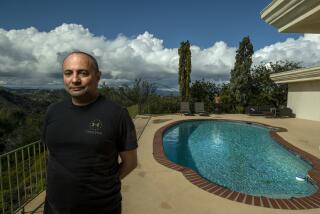Zyuganov Is Confident, Statesmanlike in Defeat
- Share via
MOSCOW — He ran a flawed campaign, blew a huge lead in the polls and was crushed in a landslide by an ailing, unpopular incumbent. In most countries, a loser like Gennady A. Zyuganov would be all washed up.
But Russia’s Communist Party boss emerged from defeat in a self-assured and statesmanlike mood Thursday, sounding very much like the undisputed opposition leader in what he called an emerging two-party democracy.
While grudgingly conceding Wednesday’s presidential election to Boris N. Yeltsin, Zyuganov cautioned that “in a devastated country no one can be the winner.” With 40% of the vote, he said, his Communist-led alliance had fought back from “semi-legal status” to become “the spiritual leader of Russian society” and chief defender of those impoverished by free-market reforms.
Zyuganov’s performance at an evening news conference was notable not only for his assertiveness but also his conciliatory tone. More remarkable, he distanced himself further than ever from the Communist Party that has shaped his life.
He spoke not as a Communist but as the leader of the People’s Patriotic Bloc--the Communist-nationalist coalition put together for the election. And he sought to redefine the bloc as mainstream center-left--based, he said, on ideals of “justice and law.”
Asked whether the Communist Party would absorb its five smaller coalition allies, he said: “How can the party, with 600,000 members, incorporate the 30 million who voted for us? No, [the bloc] will be a broad-based association with its own program and charter. . . . This movement has a very good future.”
Zyuganov has good reasons to downplay the party of Lenin, Stalin and Brezhnev. His non-Communist allies blame Zyuganov’s defeat on his identification with the party--and on Yeltsin’s effective campaign against the Soviet past. Most Russians who voted Communist are older people nostalgic for the Soviet welfare state, so the party appears doomed to die with them. There is also the fear that Yeltsin could try, as he did in 1991, to ban the party.
“Zyuganov really wants to change the name of the Communist Party, and now he has a chance,” said Sergei Markov, a political scientist at the Carnegie Endowment for International Peace.
Shedding the old label fits with Zyuganov’s postelection strategy, which he outlined Thursday, of leading a responsible opposition.
Just last month, he and other Communists were predicting that Yeltsin would steal the election.
Citing scattered reports of vote fraud, Zyuganov said Thursday that the party would press its complaints in court--but without any intent of reversing Yeltsin’s victory.
He said his coalition will form a “shadow government that will make proposals and be in opposition to the present course” while preparing for December elections of regional governors and local officials.
But Zyuganov said he and other members of the bloc are willing to join Prime Minister Viktor S. Chernomyrdin’s Cabinet if it agrees to work “for the revival of Russia.”
Chernomyrdin has stated his willingness to accept Communist ministers and modify some reform policies, so “we should not lose our historic chance to regain a share of power,” said Alexander A. Prokhanov, a leading non-Communist advisor to Zyuganov.
It is far from certain, however, that this talk of compromise will lead Russia, after a millennium of autocracy, toward a stable political system in which major parties accept common rules of a democratic game.
For one thing, Zyuganov’s attempts at conciliation are risky for him because his control of the Communist Party and the broader alliance are not yet assured. During the campaign, he alienated hard-line Communists by courting the Russian Orthodox Church and promising that there would be no return to Soviet “excesses.”
*
Zyuganov’s promise last week, if elected, to form a coalition government of all political forces in Russia so alienated the militant parties of his coalition that three of them are on the verge of quitting.
“It made me vomit,” said Stanislav N. Terekhov, chairman of a powerful union of retired military officers, who has already left.
Now, in defeat, Zyuganov is still trying to balance the Communists against nationalists like Prokhanov, who has advised him to create “a synthetic cocktail of national-patriots and socialists,” from which “the Communist element will be washed out and gradually disappear.”
Zyuganov has summoned his unwieldy coalition--which also includes agrarians, Stalinists and some non-Communist nationalist parties--to meet Saturday to endorse his leadership and a political strategy that includes expanding the bloc to include more centrists.
But Sergei N. Baburin, a leader of one of the parties, said the coalition was created for the election and had already “ceased to exist.”
Communist leaders interviewed since the election say they expect Zyuganov, on the strength of a Russian Communist’s best showing ever in a free election, to remain party leader.
But they caution that the mood of conciliation could quickly sour if the pro-Yeltsin bloc in parliament succeeds in a budding campaign to oust Gennady N. Seleznyov, a Communist, from the chairmanship of the Duma, the lower house.
A scenario prepared by Communist officials before the election predicts what might happen then: Communist lawmakers would try to block Yeltsin’s 1997 budget, provoking a showdown that would tempt the president to dissolve the Duma and set off “a revolutionary situation of mass strikes and spontaneous protests.”
It was with such an outcome in mind that Zyuganov hardened from his statesmanlike tone for a moment Thursday night.
“As I said, we are against radical street methods,” he warned. “But if the social and economic status of our citizens continues to deteriorate, I do not rule out the possibility of mass riots.”
More to Read
Sign up for Essential California
The most important California stories and recommendations in your inbox every morning.
You may occasionally receive promotional content from the Los Angeles Times.













